Clement Attlee’s legacy is often heralded as the foundation upon which the welfare state was built in the post-World War II United Kingdom. Now, however, Sir Keir Starmer seems to be steering the Labour Party on a troubling path where the focus on social security is overshadowed by a new and aggressive narrative: that of a warfare-ready state. This alarming shift was recently accentuated during a speech at a Glasgow shipyard, where Starmer proclaimed the UK’s urgent need to brace for potential conflict, escalating his rhetoric around national security to unprecedented levels. Such declarations inevitably raise the question: at what cost does this “preparedness” come?
Stark Contradictions in Policy
While Starmer positions himself as the prime minister to confront grave threats head-on, he simultaneously demonstrates an unsettling reluctance to commit to substantial defense spending. He spoke of a strategic defense review anticipating an increase in the UK’s military readiness, indicating that the armed forces must be primed for “war-fighting readiness” against the most significant threats since the Cold War. Yet when pressed about the crucial promise to allocate 3% of GDP to defense—a pledge essential for the measures outlined in the review—he hesitated. This dichotomy reveals a troubling trend in political accountability; here is a leader rallying for national security while appearing impotent in following through with necessary financial commitments.
The Folly of Sticking Plasters
Starmer has often decried “sticking plaster politics,” where short-term solutions placate immediate problems without solving underlying issues. Ironically, his response to the demand for military readiness seems to embrace the very principles he criticized. His insistence that spending adjustments are “subject to economic and fiscal conditions” implies a political caution that is unbecoming of a progressive leader. One might hope for a leader willing to make difficult choices, not just for security, but also for the well-being of citizens. Striking a balance between enhanced defense and social welfare should not be an impossible task, yet Starmer seems trapped between addressing military needs and reversing cuts to critical programs like the winter fuel allowance for pensioners.
An Intimidating Balancing Act
The political landscape is littered with consequences from local elections that suggest public dissatisfaction with Labour’s current trajectory. The aftermath has prompted Starmer’s government to reconsider cuts that previously seemed immovable, such as the winter fuel allowance and the controversial two-child benefit cap. By inching toward the reversal of such cuts, Starmer risks appearing weak on his own commitments. It raises an essential question: will he prioritize military spending over social justice, or is he willing to risk political capital on welfare reforms that resonate deeply with his voter base?
As he faces the political heat, Starmer must confront the true extent of his ambition as a leader. His promise to create a warfare-ready state should not negate the obligation he has to the vulnerable citizens who have placed their trust in him. Each choice will demand trade-offs that could define his administration, yet he appears hesitant to engage in the necessary dialogue about these trade-offs.
Accountability in the Age of Conflict
In an era where geopolitical threats loom large, it is crucial for leaders not to cow to fear-based responses that endorse militarism at the expense of social welfare. Starmer must delineate a clear vision—one where national security does not come at the cost of the welfare state. Citizens require not only protection but also the assurance that their basic needs will be met. Failing to answer the pressing questions of his policy choices, Starmer risks alienating the very constituency that desires both safety and equity. As he navigates this precarious political terrain, his willingness to openly address these conflicts will dictate both his fate and that of the Labour Party. The time for vague promises has passed; the demand for strong leadership backed by actionable decisions has arrived.


Leave a Reply